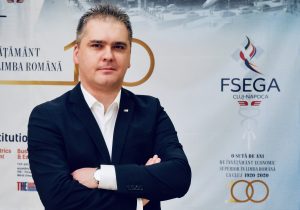Babeș-Bolyai University (UBB) is the largest and highest-ranked university in Romania. Its Faculty of Economics and Business Administration (FSEGA) is the largest faculty at any university in Romania. It is also the highest-ranked institution in the country for management and business and top-ranked for economics. The faculty was founded as a standalone institution in 1878 and became part of UBB in 1961. It has more than 9,000 students enrolled in its bachelor's, master's and doctoral programs.
As part of my work at SAS, I am developing a stronger relationship with the dean and faculty. Working with universities is an important element of SAS’ focus on nurturing young talent. Our goal is to help potential data scientists develop their skills.
Building partnerships around priorities
Both academics and industry experts agree that this kind of collaboration is crucial. Analysts need to learn to work with messy real-world data sets. It gives them a head start on solving real problems that make a difference to the world or to businesses. This is particularly important in Romania, which is a critical location for improving anti-money laundering activity and reducing fraud.

Răzvan V. Mustață, the Dean of UBB FSEGA, agrees that collaboration is an important way to help students prepare for the world of work, and also to make a contribution to society more generally. He says that the faculty has three main priority areas for development.
“The school’s approach is based on three different dimensions: research, teaching and student development, and finally, service to the community, which is highly important for us. The three go together. You need to have the right knowledge and skills to contribute effectively to society. For example, you might need knowledge of economics, but it must be coupled with knowledge about society and responsibility to be fully effective.”
He adds that the COVID-19 pandemic forced the school to rethink some of its courses and options, especially to address the third of these dimensions.
“We developed a different kind of project and involved colleagues, including researchers and PhD or master's students. In these projects, the university carries out some research, aiming to deliver a defined solution to the market. This is a new approach, and in the medium and long term, we are sure that the employers of our students will see the benefits of this change in how we approach things.”
Learning from experience
Around the world, digital transformation means that everything is changing fast. However, Mustață suggests that it is not necessary to have all the tools to hand. “I think we learned from the pandemic that if you really need something, you can generally develop it, drawing on existing tools. There are always ways to rework things to fit new situations.”
One recent key change in Romania is its development into a favored near-shoring location. Mustață has noticed some changes in demand reflecting differences in the near-shoring and local economies.
“There are definitely different approaches in the two areas. However, the level of our school helps. We are the largest faculty of economics and business in Romania, so we have all the resources necessary to address the demands of these two dimensions, or any other that emerges. We serve the local market and local businesses, and we support and encourage innovation and entrepreneurship, including social entrepreneurship. However, we also have strong partnerships with multinational companies and work with them to deliver solutions involving research or education. I think our students have the necessary skills to move into either area.”
Emerging opportunities – and new responsibilities
Mustață expects to see new opportunities for the school from projects in areas like anti-money laundering and fraud. “I want to see my colleagues become better at doing research in these fields. Romania has huge potential in terms of economics and human resources, but it needs to deal with problems around money laundering and fraud. We have the resources to do this, but we need to target them more effectively. As dean, I hope that my colleagues will be fully involved in this kind of project and develop their skills in this sort of research in the future."
Mustață thinks research will be important for this effort. "I’d really like to see us develop a research unit that could focus on fraud or money laundering," he said. "Of course, this research unit will be part of a complex architecture of centers and research units specific to the economic field and the business environment. I think this would have a huge impact on society, and of course, that’s the third dimension for our university, alongside research and education.”
To better understand if Romania needs to boost its anti-money laundering capabilities, SAS and UBB FSEGA have partnered to explore the readiness of the market to address modern money laundering challenges. To find out more, visit Real-Time Anti-Money Laundering in Romania.

2 Comments
Thank you, Alina, for this. Great article, inspiring!
Thank you Katarina!